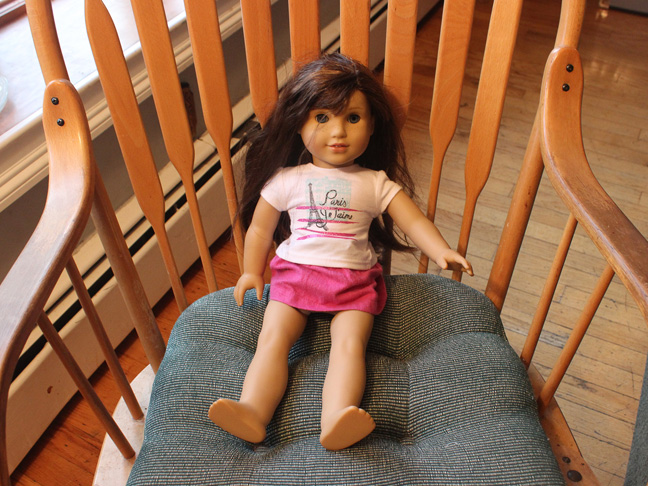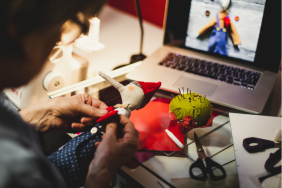For one, I’ve always thought dolls were creepy.
I hate the hard plastic, and their human-like-but-not-human faces; they’re just a few notches down from clowns on the terror scale. I can’t be the only one who feels that way, or there wouldn’t have been that still-chilling Twilight Zone episode about Talky Tina.
In case dolls alone aren’t creepy enough, we have the nice folks at American Girl to thank for making them cultish, too. Not only has the company convinced families across America that these dolls are must-haves, they’ve made it aspirational-elitist as well, by charging over a hundred bucks a pop for each one and then inspiring an endless craving among its little girl owners for accessories, costumes, elaborate play sets, and yes, even clothing the girls can wear to match. They’ll make a doll look like your daughter for an extra fee, but I think it’s a little bit cheaper to make your daughter look like the doll. Help!
The price tag, the status, the manipulation, it’s all too much. We don’t like succumbing to these things and the dolls themselves aren’t any less creepy for the price tag. And the stereotypical girliness of the whole American Girl machine is a hard pill to swallow.
When I found out I was having a girl, I was sure I was going to have one of those daughters who didn’t swoon for glittery princesses and dainty little fairies, who wasn’t asking when she’d be old enough for high heels and make-up. I was going to have one of those daughters who had no limits, who wasn’t held back by what people thought girls should do, like and be. I thought it would be so cool that my daughter would wear greens and blues and grays, or maybe even all black at age 5, and she’d find herself bewildered by the popularity of princesses who did nothing all day but bask in their own beauty.
That isn’t quite what happened.
Instead I gave birth one glorious August day to Juliet, who loves things that glitter and sparkle, loves princesses and fancy dresses, and wishes I’d let her wear mascara. She loves fairies and dollhouses and movies about tween girls who sing, but she also wants to watch baseball on TV and play poker. She likes Strawberry Shortcake and My Little Pony, along with Age of Empires and Minecraft. She enjoys soccer, which she’d play in a sparkly pink dress if they let her. Turns out, she doesn’t have limits after all. This is our girl, and she is who she is, unique in all ways, and magnificent. And I wouldn’t have it any other way.
So yes I hate dolls, and places that tell you what you want, and the idea of spending over $100 for something just because of its brand name makes me want to hurl. But I swept aside my harsh and critical opinions of the American Girl universe, and took a gentle, critical look at my daughter. She’d held on to this doll desire for a long time, and her eighth birthday was coming, and we have a thing in our house about making birthdays magical.
I gave in.
We took her to the American Girl store in Manhattan. When we arrived, we were surrounded by plastic cheeks and blinking eyes, vacant stares and elaborate play sets. Everything was available for purchase with the most whacked-out price tags I’ve ever seen.
My friend Jenny came along for the shopping trip. Jenny’s known me longer than my husband, and thinks it’s the funniest thing ever that I gave birth to such a girly girl. Jenny wanted to buy Juliet something to go with her doll, and suggested various accessories: the welcome kit (flowers, macaroon), or a t-shirt Juliet’s size so she could match her doll. But Juliet had her mind on something else.
“I want the wheelchair!” she said.
What?
She did. Then another kit caught her eye, one with casts and bandages and crutches, and she chose that instead. We were all confused but a little impressed. “I want to be a doctor,” she told us.
Jenny bought it for her.
At the store, as they were ringing us up, they asked me for my zip code. I gave it. Then they asked what name I wanted on the account. “What do you mean?” I asked. “We want to know what name you want associated with the purchase.”
“Doesn’t my credit card do that?”
“No, we mean, with the store.”
I was right. It’s a cult! I kept my name to myself, and walked out the door with my $110 purchase. But with a glance at my credit card, they know who I am, and there’s nothing I can do about it. I might not even be able to stop the catalogs from coming, the ones all the other parents warned me about.
But here’s the bottom line: This is not about me, not one whit. I am not my daughter, and my daughter is not me. She’s not an extension of me, she’s her very own self, authentic as they come. And now, she has an American Girl doll that makes her happy. She really does love that damned thing, so I guess I am happy too.
Just don’t leave it near me after dark.
Photo: Laurie Ulster








